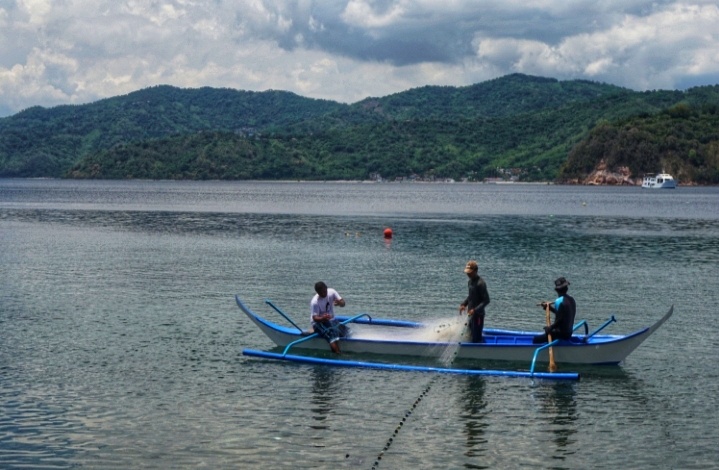Photo courtesy of Daniel Ocampo/Oceana
As we commemorate World Food Day, the issuance of fishing vessels monitoring rules by the Department of Agriculture-Bureau of Fisheries and Aquatic Resources is a timely and important step to secure the food of our children and the next generation.
The technology will make monitoring in our municipal waters more efficient and will deter and prevent illegal, unregulated and unreported fishing. Our fisheries and other marine resources will be able to breathe and recover from decades of overexploitation and abuse and produce sustainable seafood for our future.
This was the statement issued by Oceana and other civil society groups, local governments and artisanal fisherfolk after the Department of Agriculture Secretary William D. Dar signed Fisheries Administrative Order 266 on October 12, 2020.
“We welcome the issuance of the guideline for vessel monitoring mechanism that covers all commercial fishing vessels more than 3 gross tons. Consistent with the provisions of Republic Act 10654, and sustainable fisheries management, we believe that this can help curb illegal, unreported and unregulated fishing especially the encroachment of commercial fishing vessels within the 15-kilometer municipal waters. This is a big win for coastal local government units and fishing communities and a contribution towards the modernization path of the Philippine fisheries industry,” said Dinna Umengan, coordinator of the Pangisda Natin Gawin Tama (PANAGAT), an umbrella organization of non-government organizations working with fisherfolk, ocean and environment conservation.
Mayor Gerard Montojo, President of the League of Municipalities of the Philippines Romblon Chapter, was among the first local chief executives to call for the immediate issuance of the vessel monitoring rules, particularly when the local governments have to deal also with the COVID19 pandemic response.
“We cannot allow illegal entry of commercial fishers in municipal waters. It is even more unacceptable that these commercial fishing operators are taking advantage of the situation that our attention is directed at this COVID19 pandemic, trying to keep our constituents healthy and spared from the spread of this virus. The immediate implementation of the rules on vessel monitoring measures is most needed. We need support in monitoring our municipal waters and the tracking device installed on commercial fishing boats plying our territorial waters is a big help so we can run after them, seize their boats, and arrest them so they are held accountable by the law,” Montojo said.
According to Oceana Vice President Gloria Estenzo Ramos, “for most of our coastal towns and islands, fishing and a vibrant and healthy ocean are imperative for the people’s food, well-being, and sustainable livelihood. It is, thus, not surprising that local governments are among the first to stand up and call for effective vessel monitoring mechanisms to help stop and deter the illegal entry of commercial fishing in the 15-kilometer municipal waters under their jurisdiction,” she added.
The local government units of Bantayan and San Remigio in Cebu; and San Carlos, Escalante, Sagay, Cadiz, Calatrava, Toboso and Manapla in Negros Occidental also appealed to the Department of Agriculture-Bureau of Fisheries and Aquatic Resources (DA-BFAR) to immediately issue the implementing rules of the fishing vessels monitoring mechanism.
The North Negros Aquatic Resource Management and Advisory Council (NNMARC) passed a resolution on July 6, 2020, “strongly urging the DA-BFAR to immediately implement vessel monitoring mechanisms in small and medium commercial fishing vessels that are found to be entering municipal waters where these are prohibited by the Fisheries Code.”
The council, formally established in 2000, is an alliance of San Carlos, Escalante, Sagay, Cadiz, Calatrava, Toboso and Manapla local governments to collectively protect, rehabilitate and manage the coastal and marine resources within the municipal waters of its members.
“Continuous intrusion of commercial fishing vessels results in overexploitation of fisheries and aquatic resources that has direct adverse effects to our constituents, especially the fisherfolk communities of our towns. Vessel monitoring measures will help address the pressing issues on illegal, unreported and unregulated fishing and ensure transparency in the fishing industry. For coastal local governments to be effective partners in the full implementation of our laws and promote food security,” the group stated in the resolution.
International non-government organization Oceana commends the leadership of Secretary Dar for fulfilling his commitment to implement the law. “The implementation of the vessel monitoring mechanism requirement will change ocean governance in the country as we will have more responsible fishers in our seas and thus promote food security,” said Ramos.
Apart from the local governments, Oceana, with fellow member organizations from PaNaGaT, called on the DA-BFAR to issue a lawfully compliant guideline and avoid further delay in the full implementation of the vessel monitoring requirement of the Fisheries Code as amended by RA 10654.














